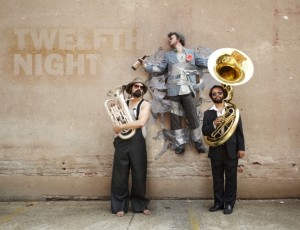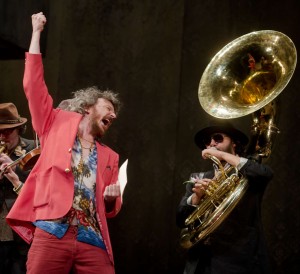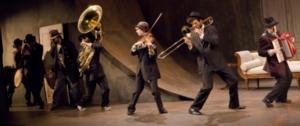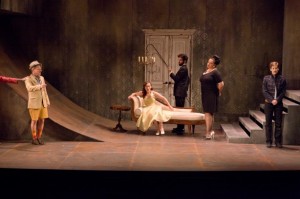 The aggressive, over-the-top staging of Maria’s wedding to Sir Toby near the end of Pig Iron’s great production of Twelfth Night down in the Lower East Side almost ended up with Charleigh Parker’s big body in her wedding gown — an inspired bit of casting to see a true “giant” in this role — lurching into my too-long legs as they stretched out into the aisle. Parker’s Maria launched herself down from the stage and I pulled back my legs as she blasted up the aisle. It was that sort of show: loud, fun, physical, not just in your face but almost in my lap. I’ve never seen this wedding staged before, never felt a production so clearly committed to putting the gullers and drinkers at the play’s heart.
The aggressive, over-the-top staging of Maria’s wedding to Sir Toby near the end of Pig Iron’s great production of Twelfth Night down in the Lower East Side almost ended up with Charleigh Parker’s big body in her wedding gown — an inspired bit of casting to see a true “giant” in this role — lurching into my too-long legs as they stretched out into the aisle. Parker’s Maria launched herself down from the stage and I pulled back my legs as she blasted up the aisle. It was that sort of show: loud, fun, physical, not just in your face but almost in my lap. I’ve never seen this wedding staged before, never felt a production so clearly committed to putting the gullers and drinkers at the play’s heart.
Minute to minute the show floated for over three hours on sheer brilliance from The Only Band in Illyria, a six-piece wonder of Balkan gypsy magic.
The band started up right in front of my seat in the front row and played for 20 minutes or so before the opening curtain. Violin, stand-up bass, accordion, two different drums, tuba, and trumpet. During the show the musicians kept hiding under staircases & popping out to punctuate the comedy. I bought the CD at the interval & listened on the foggy ride home. My favorite tune, of course, is “Salt Water Thief” — but it’s hard not to love “Nothing But Madman (Toby’s Tango).”
I’ve seen a lot of good productions of this play, including two brilliant all-male versions, from Propeller and more recently the Globe’s traveling version with Mark Rylance. Pig Iron didn’t hit Propeller’s melancholy, and none of the players quite matched Rylance’s coiled-spring intensity. But the fun they (and we) had! I especially loved the company’s principal members, director Dan Rothenberg, James Sugg as a wonderfully louche Sir Toby, Dito van Relgersburg as a towering Orsino who managed to be both charismatic and goofy. Sir Andrew sported a faux-hawk and rode a tricycle to deliver his challenge to Cesario: really, what’s not to like?
The Times review seems to have fallen under the spell of Chris Torn’s Malvolio and his slow burn-into-rage in the final moments. I was more taken by his first smile, when reading Maria’s letter has convinced him that his mistress loves him. He reads in a post-script that she wants him to smile, and so he tries, painfully, slowly, the movements spreading, cracking, opening up his face. It made him look like a fool — but that’s the best thing to be in this play.
Nothing quite like a truly festive comedy. Get down to Grand Street before Sunday if you can!



Leave a Reply